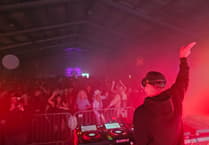Fixing defective roadworks on one of the island’s busiest roads may cost up to £500,000 - 10 times the price of the original scheme.
Colas (IoM) has been in dispute with highway chiefs over the failed surface dressing on Richmond Hill.
And correspondence released under Freedom of Information reveals the contractor believes it has been ’pushed’ into surface dressing roads where it isn’t appropriate.
Colas, which has a contract with the Department of Infrastructure for an annual surface dressing programme, carried out the works on Richmond Hill in August 2018 at a cost of £50,015.
But the overtaking lane had to be closed and a 30mph speed limit introduced when the surface chippings came loose.
Remedial works are due to take place over the summer.
But the estimated cost could be up to £500,000 in a worst case scenario if the road has to be ’planed out’ and a new surface course laid.
In a response to the FoI request, the Department of Infrastructure insisted Colas is responsible for correcting the defective works in accordance with the terms of the contract.
A series of emails between the DoI and Colas show neither side accept blame for the failing.
The department referred the dispute to adjudication in September 2019, seeking Colas pay the £500,000 estimated cost of the remedial works.
But DoI chief executive Nick Black told the Manx Independent that the formal adjudication process has not begun as both sides ’work towards a mutually acceptable solution’.
In a report for the DoI consultants TRL concluded that the 10mm single dressing carried out on Richmond Hill was inadequate.
A double dressing process - 10mm plus 6mm raked in - had been ruled out by Colas as it only had one chipping machine that could climb the steep hill.
TRL recommended the surfacing be replaced with a surface course inlay as the ’lowest risk option’.
In an email sent to DoI construction manager Gary Saunders in August 2019, Colas (IoM) said: ’Overall, we feel aggrieved that we have pushed into surface dressing a site which we suggested was not fit for surface dressing.
advice
’Time and again the DoI is trying to push the surface dressing process beyond its capabilities and not listening to our advice.
’Unfortunately now as a result surface dressing is completely out of favour which is a terrible shame as it is a cost-effective solution to extending carriageway life.’
Colas said it had suggested a 6mm single dressing but claimed the DoI ’clearly changed the proposed solution’ and took over design responsibility to specify 10mm chippings.
It argued the supplied chippings may have been ’too dusty or dirty’ as they had not been properly washed at Poortown quarry, and pressure washing and sweeping may have had a detrimental effect.
’We feel unfairly treated by the department and this is exacerbated by the Minister’s public statements,’ said Colas.
’So it is our view that it will be unfair to request the fee for Richmond Hill to be returned and if the department was looking for us to pay towards the resurfacing, then we would seek legal advice.’
In March 2019, Colas had offered to forfeit the £50k fee for the Richmond Hill dressing but be paid by the department for the remedial works.
Consultants TRL said dirty or dusty aggregate was unlikely to be a major factor in the surface dressing failure. It said the use of a more costly premium binder may have helped reduced chipping loss.
In October last year the DoI wrote to Colas rejecting the company’s proposals for remedial works.
treatment
It suggested instead a ’plane and 40mm surface course inlay’ or the double dressing treatment suggested by TRL.
If the contractor went with the second option it had to come up with a design for approval by February 28 this year - and if it wasn’t approved Colas would have to plane and inlay at its own cost and expense.
Mr Black said: ’The remedial works for the surfacing are being progressed. As the two parties continue to work towards a mutually acceptable solution there has as yet been no need to commence the formal adjudication process.
’Specialist staff will be needed and subject to any travel restrictions it is hoped that the remedial works will be done in the summer.’
’The estimated cost of £500,000 is the worst case scenario if the road had to be planed out and a 40mm surface course inlaid to rectify.’
Richmond Hill was due to close for drainage works between the January 11 and 14 but this was cancelled due to the lockdown.

.png?width=209&height=140&crop=209:145,smart&quality=75)


